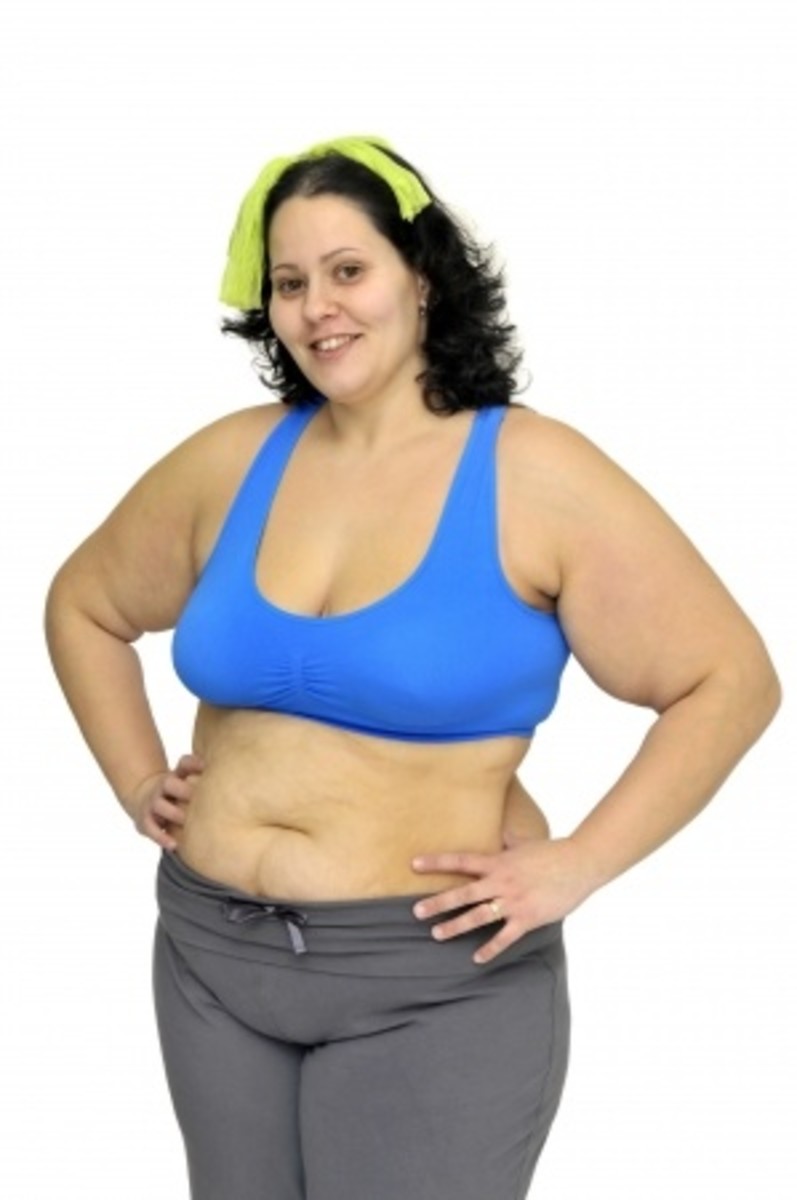Fitness and Body Image - Is America fat or just comfortable with itself?


Thin Does Not Equal Happy
When I was seventeen, I gained a lot of weight. After weighing around 130 pounds ever since I reached my adult height at the age of thirteen, in the first four months of my senior year, I gained twenty-five pounds. Maybe it was breaking up with a boyfriend who never ate. Maybe it was hanging out with super-skinny friends who ate chocolate muffins and pizza at midnight on a regular basis. Maybe it was my adult metabolism kicking in earlier than most. Whatever the reason, it spelled disaster for a teenage girl. Suddenly, I couldn't get my jeans up over my hips. I wore sweatpants to high school most days and felt like crap about myself. My body image was in the toilet.
Finally, after several failed attempts at dieting, I talked my mom into paying for me to join a well-known weight-loss program that taught me when and what to eat. By the time I left for college, I'd lost fifteen pounds. After I added working out at the university rec center to my regimen, I lost the rest of it and found myself back down to 130 pounds. Problem solved, case closed, happy ending, right? Wrong. That's only the tip of the iceberg.
After I lost the weight, I was terrified of gaining it back. If I skipped a workout, I beat myself up and felt guilty. If I splurged and had cake at a birthday party, I worried about it for days on end. And, in an effort to avoid fat, (back then, fat of any kind was the devil, according to weight-loss gurus) I ended up eating very little protein. I exercised, and I was a healthy weight, but I was anemic and obsessed with the scale.
Fast forward to now: I have gotten a lot better. I eat a lot more protein, and I feel better. I have more energy, and my hair and skin show the benefits, too. I am not as obsessed as I once was, and don't freak out for days if I eat half a cookie. It's still a battle, though. Several months ago, after spending the summer with the kids out of school, I realized I'd been a little lax in the diet and exercise department and had gained about seven pounds. I was angry at myself and depressed for several days. Then, I got back on the horse and lost the extra fairly quickly. It got me thinking, though. While I truly believe eating healthily and exercising are good for both mind and body, being obsessed with them isn't. Is it okay if you have ice cream every now and then? Is it fine if you have a period of time where exercise just isn't the priority and you gain a few? Is it (drum roll) even all right if you decide all this exercise and eating right isn't worth it, and you just want to be fat and happy? I know this is going totally against today's grain, but I'd like to give it a big HELL YES! Let me explain why.

Domestic Diva's Response to Mrs. Kang:
What's Your Excuse?
We all remember Mariah Kang, the uber in-shape California mom who posed in her workout wear with her three young children and posted it on Facebook. When I first saw the photo, I thought, "Wow, she's amazing to be in such good shape with three young kids. Go, Mom!" Then I read the caption: What's Your Excuse? and I scowled at it. Her photo and caption perfectly capture the moment where physical fitness crosses over into a body image/self-worth issue. Is she healthy and in good shape? Yes, she certainly appears to be. Is that admirable, considering all the work she had to do to get and stay there? In my book, yes. I'd even go so far as to say, "Post those pictures. Be proud of yourself. Go, Mariah!" But is, What's Your Excuse? a universal, positive message? No, I'd say it's pretty judgmental. I know there are some people out there complaining they don't have time to workout and eat right. To them, I'd say, if you really want to, you'll make time for it. BUT there are also a lot of people who consciously choose not to use all of their free time working out. There are people who think it's worth a few extra pounds to eat more doughnuts than they should or drink more beer than they should. For those people, the answer to What's Your Excuse? is, "Nothing. I'm not making excuses. I like my body, so screw off."
Poll
What Is Your Approach to Fitness?
Being Physically Fit
Don't get me wrong. I am not dogging on the fitness world. I actually work out quite a lot, and I love it. I eat healthily most of the time, too, and I'm glad I do. I feel better, I have more energy, and I'm nicer to my kids. If I knew someone who wanted to get into better shape, I'd totally be their cheer leader. I think it's a great goal, because it can improve the quality of your life. What gets me, though, is no matter how many workouts a week I do, there are always the ads and billboards asking me what my excuse is. I want to shout at them, "I work out, damnit! I eat right, and I try to go to bed by ten thirty on weekdays! What more do you want!" I know I ought to be able to ignore these messages, but maybe I'm just not confident enough to do that yet. I know I could work out more, drink less wine and have a more conventionally attractive body - get rid of that pesky cellulite that plagues my summer days. But, you know what? On some level, I'm afraid to. I'm afraid I'll end up working out every free minute, obsessed with the scale again, and ignoring my children and my writing. Then, once I know what I can look like if I just try hard enough, I won't be able to go back to now. In the now, I have a healthy body and a balanced life. Sports Illustrated isn't going to call me for the swimsuit issue, but I'm good with that.
- See Why We Have An Absolutely Ridiculous Standard Of Beauty In Just 37 Seconds
Reality check! Any woman who feels she's not good enough might understand why after watching this.
Body Image
Body image is, according to Google, "the subjective picture or mental image of one's own body." It has little to do with how you actually look. It's also technically unrelated to physical fitness… except when you see ads for a gym with all those four percent body fat, rock-hard abs, models on them. These people have actually linked being in good shape to how society says you should look. The unspoken message here is, "if you don't look like this, you need to work harder." I know why those ads are there. I know they are there to sell gym memberships, and the Average Joe's (Dodgeball) "we like you just the way you are" message doesn't have the same impact. Just because I understand it, though, doesn't mean I have to like it.
Celebrities and models are made-up, air-brushed, and their photos altered to make legs longer and thinner, skin smoother, and eyes bigger. If you want to be attractive, you have to look like the models and celebrities, who actually don't even look like that themselves in real life. No wonder so many impressionable young people's self-esteems are in the toilet. Some people, I suppose, are strong enough not to let these images worm their way into their sense of self. I am working on it, and doing much better at it than I did at fourteen. Am I being unreasonable and naïve, though, to wish there were a few more television shows out there like HBO's Girls* who show what real people look like?
* Honestly, I watched Girls a couple of times, and I don't get it, which makes me feel square and very un-hipsterish, but I really wanted to like it because of the body imagery it promotes.
Peter LaFleur Promotes Average Joe's Gym in Dodgeball

A Rebuttal to the Above
As a counterpoint to what I said about body image, there's no denying the human appreciation for the aesthetic. From the art on your wall to the clothes in your closet to the person you just can't take your eyes off at the club (gym, library, grocery store… wherever you hang out) there's no denying sometimes we like what we see more than others. It also and even especially applies to looking at ourselves in the mirror. I'm not suggesting it's wrong to find someone more or less attractive because they are thinner or fatter or to admire your own reflection a little when you're feeling particularly sexy in your new jeans. The problem comes when you define your own or others' worth by how you/they look, for example, assuming an overweight person is lazy, or assuming a fit person is a shallow gym rat or becoming extremely depressed and down on yourself because you don't look as thin as your best friend does in a bikini.

Judge Not...
So, in conclusion, what would my little world of hearts and flowers and rainbows look like? Ads for gyms would picture all different body types. They might all be in good shape, because they're selling fitness, but "good shape" does't have to mean a six-pack or a derriere you can bounce a quarter off of. We'd promote fitness because it's good for your body. We'd applaud and encourage people to be healthy but wouldn't judge people who choose a different lifestyle than our own. And maybe we'd realize that just because a person is heavier than is socially acceptable doesn't mean they aren't healthy. All bodies are different, and not everyone will be model-sized, even if they do have a healthy lifestyle. Until the world gets there, though, I guess I'll just have to work on my own self esteem and not being affected by the media so much.
This is my challenge to you: the next time you walk down the street and see a fat person, don't immediately think they'd like to lose weight, but they're just too lazy. Maybe they would like to be in better shape, but maybe not. Maybe they like to eat and being a little heavy is worth it. Maybe they're going through a stressful time, or maybe they do exercise and eat well and that's just the size they are. The point is, you just don't know. Conversely, the next time you see a mom with two percent body fat powering a double jogger with two toddlers in it down the sidewalk, don't jump to the conclusion she's shallow and weight-obsessed and never talks to her children. For all you know, she ends her run at the park where she actively plays with those kids for two hours and her daily run is the only sanity she can regularly find.
If you can do that, if you can stop assuming the worst about people who exercise more or less than you do or who eat better or worse than you do, maybe you can also stop feeling guilty and judging yourself. If you can look at Mariah Kang's (in)famous photo and say, "That's great for her. My own 'great' is something else, though," maybe you can get comfortable with your unique body and your own choice of balance in life - exercise versus relaxation, carrots versus cupcakes - and be that much happier.
Related Articles
- Body Image and Self Esteem
Your body image can seriously affect your levels of self esteem. But is it different for men and women? When do the problems really begin? And what can you do to balance the scales? - Inspirational Quotes About Beauty - Body Image Quotes
When you feel ugly, a few words can be all you need to turn the day around...








